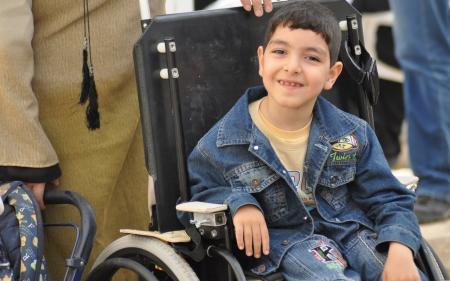What Makes a Person Special?
by Jennifer Fulwiler
Filed under Anthropology
A while back my kids were watching the Nick Jr. cartoon Ni Hao, Kai-Lan, and I happened to see something that has troubled me ever since.
Kai-Lan is a little girl with a friend named Rintoo, and in this particular episode Rintoo isn’t feeling special. Kai-Lan and her other friends seem to have an instinctive feeling that Rintoo must be special somehow, and spend most of the episode trying to figure out why that is. After some searching, they finally figure it out. At the climax of the show, Kai-Lan announces with a little song that she has found the source of Rintoo’s specialness! I suppose it was too much to hope that she’d quote directly from the Catechism, since it’s kind of hard to rhyme “man is the only creature on earth that God has willed for its own sake, and he alone is called to share, by knowledge and love, in God’s own life” with “it was for this end that he was created, and this is the fundamental reason for his dignity.” But I was surprised and distressed at what she came up with: he’s fast. That’s what makes him special. And she went on to tell her young viewers that the next time they’re not feeling special, they should remember what they’re really good at, and know that that’s what makes them special.
Anyone else find that disturbing?
As I watched the little characters dance around and celebrate the various skills that supposedly made each one of them special, I was guessing that this wasn’t going to be the episode where Kai-Lan’s slow, mentally ill, physically disabled friend was introduced, because then things would get really awkward.
Though I don’t attribute any malevolent intent to the show’s writers, I think the sentiments expressed in this episode belie one of the disturbing logical results of a completely secular worldview. It’s an interesting look at what happens when we take part of the natural law that’s written on our hearts—in this case, the fact that every human is special—and try to explain it without God. Kai-Lan and her friends know on some level that Rintoo is definitely special; and yet they are products of a secular culture which teaches that every truth must be provable by the scientific method in order to be accepted.
There are two main definitions for special: one is “regarded with particular esteem or affection” and the other is “superior in comparison to others of the same kind.” The first is a better definition for describing the inherent specialness of each person, since each of us is regarded with particular esteem and affection by our Creator. But you can’t get there by looking at the material world alone. In order to confine specialness to the realm of the observable and the provable, you must go with the later, twisted understanding, which leaves you with a malleable definition of what it is to be special. In Rintoo’s case, what if the setting of the episode were moved to the U.S. Track and Field Team’s practice arena, where he wouldn’t seem fast at all? Or what if he became disabled and could no longer get around quickly? For that matter, what if all of humanity got together and agreed that being fast was not a good trait? Would Rintoo still be special?
Chances are, he has other things he’s good at. But what if he didn’t? What if he were the dumbest, ugliest, most rejected, immobile person in the world with not a single thing to offer his fellow man? Then would he be special?
Without God, the closest we can get to explaining the truth of each individual’s specialness is to say that he or she possesses certain exceptional skills or qualities that are currently valued by other human beings, or to perhaps note the fact that each person is different by virtue of his or her unique DNA. But neither of those statements articulate the full truth—and somewhere, deep down inside, we all know it. The problem is this: the reason every single one of us is inherently special—even the most flawed, the most unproductive, and the most decrepit among us—is because we are special to Someone. It’s because we are loved and valued by God himself.
When people agree on this, even if it is based on vaguely theistic concepts of God rather than passionate Christian devotion, it acts as a societal safety valve. We at least agree that it is not up to us to determine what makes another person special, or whether or not he’s special at all. Each person’s value comes from Something outside of and higher than people’s opinions, a Force untouchable by human caprice. When we lose this concept and start thinking that we can value other people based on demonstrable evidence, the safety valve is gone.
That’s what scares me about this line of thinking. Right now, the dark implications of this worldview are easy to ignore; here in the Western world, we live in a time of unprecedented stability, peace, and abundance that makes it relatively easy for us all to get along. There are only a few types of people whose specialness we have motive to disregard (the severely disabled and the unborn, mainly). But that probably won’t last forever. If any elements of society were to be destabilized, we faced widespread resource shortage, or any other situation came up that caused an epidemic of fear and tension, there would be a lot more pressure to disregard the value of other people’s lives. If we continue to see our fellow human beings as special based on arbitrary, flexible definitions that are ultimately rooted in human judgment of evidence, the devaluation of human life will spread to even more segments of society. And one day it could be you or someone you love who is no longer considered special.
Related Posts
Note: Our goal is to cultivate serious and respectful dialogue. While it's OK to disagree—even encouraged!—any snarky, offensive, or off-topic comments will be deleted. Before commenting please read the Commenting Rules and Tips. If you're having trouble commenting, read the Commenting Instructions.













